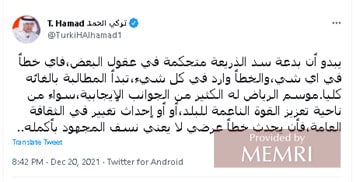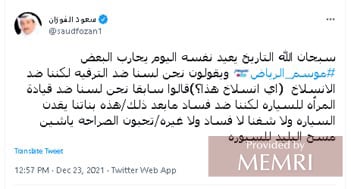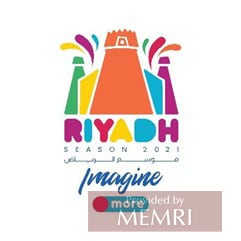Introduction
In the recent years, Saudi Arabia has been experiencing far-reaching social change, led by Crown Prince Muhammad Bin Salman, who seeks to modernize the country and make it friendlier to tourists and to business. The conservative kingdom has seen many transformative reforms, including the removal of the ban on women driving, the opening of cinemas, and the curtailment of the role of the religious police. These significant and rapid changes are taking place amid criticism and protests from conservative elements in the country and beyond, criticism that finds expression mainly on social media, due to the strict measures employed by Bin Salman against his opponents and rivals at home.
For example, an uproar recently erupted on social media after users circulated photos and videos from concerts and cultural events held as part of the "Riyadh Seasons 2021" international festival, which took place in October and December in the Saudi capital. The pictures showed audience members in "foreign Western garb," and men and women dancing together and even hugging and kissing in public, contrary to Saudi custom.[1] One video showed men kissing, which triggered claims that the festival promoted "openness towards homosexuality."[2]
Many social media users expressed disapproval of the behaviors seen in the photos and videos, calling them reprehensible and forbidden and claiming that the festival spread promiscuity and hedonism in Saudi Arabia and undermined the country's Arab and Islamic character. Over 100,000 tweets were posted with the hashtag "We Demand to Stop the Riyadh Festival", calling to cancel the events.[3]
The opponents of the festival directed accusations at the Crown Prince, who is leading the reforms in the kingdom. The "Fahad Al-Ghofaili" Twitter account posted a picture of Bin Salman alongside pictures from the festival, with the text: "The corrupt Bin Salman says the Quran is the kingdom's constitution. God protect the Quran from your shameful and corrupt deeds. #WeDemandToStopTheRiyadhFestival." Another tweet on the same account said: "…This reprehensible entertainment does not represent the people of the kingdom or their aspirations. Bin Salman is trying to force it on us as part of implementing his foreign agenda and his Westernization plan."[4]
The Saudi authorities rejected the criticism, stating that there is an organized campaign against the festival and against the Saudi kingdom at large. They claimed that the tweets against the festival were posted by fake accounts operated by Turkey, Qatar, Muslim Brotherhood circles and by the Islamist current in Saudi Arabia itself.[5]
Many Saudi intellectuals and writers also joined the debate, expressing support for the festival. In tweets and in press articles they published, they welcomed the changes occurring in the kingdom, the openness to the desires and needs of the younger generation, and the sovereign decision to allow citizens to choose their way of life. They argued that the festival is an indication that young Saudis, and in fact all Saudi citizens, can enjoy a good and normal life, and that the photos and videos that had aroused objection documented isolated, untypical incidents. They rejected the attempts by extremist forces in the kingdom to impose a policy of strict prohibitions on the public, and claimed that there is no religious basis for banning entertainment or cultural events.

Alcohol consumption and a couple hugging at the festival (watanserb.com, December 21, 2021)
This report presents some of the responses of liberal Saudis who support the new openness in the country.
Intellectuals Speak Out Against Policy Of Strict Prohibitions
Liberal Saudi intellectual Turki Al-Hamad tweeted on December 20: "It looks like this new phenomenon – of prohibiting something [lawful just because] it can lead to transgression – dominates the minds of some people, and any mistake made – and mistakes will be made – triggers a demand to completely cancel [the event in which it occurred]. The Riyadh festival has many positive aspects, whether in terms of increasing the soft power of the state and whether by transforming the prevalent culture. If there happen to be some mistakes, that does not mean that the whole effort must be ruined."[6]

Turki Al-Hamad's tweet
Liberal Saudi journalist Sa'ud Al-Fawzan tweeted on December 23: "Praise Allah, history is repeating itself. Today some people are fighting the Riyadh festival, saying, 'We are not against entertainment, but only against renouncement [of religion and values]. What renouncement?! In the past, they said: 'We are not against women driving cars, we are against the corruption that will ensue.' [Now] our daughters are driving cars, and we have not seen any corruption or anything else…"[7]

Sa'ud Al-Fawzan's tweet
Saudi Former MP: Benighted Elements Trying To Keep Saudi Arabia From Developing; Saudis Entitled To Live Normal Lives
Zuheir Al-Harithi, a former member of the Saudi Shura Council and former spokesperson of the Saudi Human Rights Commission, wrote in his December 25, 2021 column in the London-based Saudi daily Al-Sharq Al-Awsat: "Countries cannot grow and develop without a contemporary cultural vision and without [adopting] modern thinking and behavior. Modernity means progress, development, and adapting oneself to global innovations, without abandoning one's tradition, history or identity. Saudi Arabia is effectively doing this today, and this is a genuine, real and serious turning point towards comprehensive reforms…
"The Crown Prince has spoken of the need to fight extremism… and emphasized that we [Saudis] embody the correct and moderate values. This means that nobody can spew bombastic slogans against us, for the new trend is clear and there is a firm political determination to pursue it… [However, this] does not eliminate the gaps that exist in society in terms of internalizing, digesting and accepting these [developments]. [Such gaps] are natural, especially at first… but the decision of the majority is the one that is eventually accepted, [and this decision] is evident from the surveys that have been published, which indicate that most Saudis support the decisions and changes that the Crown Prince is leading with visible determination.
SUPPORT OUR WORK

"The Saudis and the people living in Saudi Arabia are entitled to live a normal life and enjoy every kind of entertainment, sport and art… in their own country. As a citizen one is entitled to espouse [any] position or opinion, but not to prevent others from doing what they feel is right. The new atmosphere upholds the freedom of choice that the state protects.
"What is happening in Saudi Arabia is a firm message to the benighted, extremist and radical elements that hijacked society, closed up the country for decades, destroyed its culture and thinking, brought it to a state of [intellectual] poverty, closed-mindedness and hatred for all aspects of life, art and literature, and perpetuated the benighted way of thinking for the sake of their agendas. These elements killed life, yearned for death and provided fertile ground for extremist movements. Al-Sahwa [Al-Islamiyya][8] was not [just a Saudi] preaching movement, but a secret revolutionary political entity, as evident from the publications and speeches of that time and from [its] political aspirations, which conformed to the continent-spanning plan of the Muslim Brotherhood. One of the sophisticated methods it [used] to take over [Saudi] society was harnessing and exploiting religion… and imposing [the Sahwa's] ideology and plans on society, [so that] society became subjugated from the 1980s onward. For 40 years our society remained dominated by the Sahwa and its influence, [which permeated] most of the state institutions…
"Thus, [the significance of] the changes currently taking place in Saudi Arabia goes far beyond their timing, the character of the [present] stage and the ability of society to contain them. These changes can no longer be considered a luxury, but are linked to the crucial needs of the state and society. It has become patently clear that the crucial needs of the state compel the decision maker to take [whatever measures] he deems will promote the common good, while ignoring anything else.
"In every society there is an active group that is open and looks to the future… and a rival group that knows only how to sabotage and oppose change and fear innovation… Opposition to innovation and change is a sign of backwardness and ignorance in a society…
"The culture of opposing [all change] means reversing the path of human progress… At this juncture we welcome the present political leadership, which has proven beyond any doubt that it is capable of bringing change whenever it wishes to, regardless of ideological and social opposition. We are entitled to be optimistic, [and believe] that we and the coming generations will be able to enjoy the good and normal life that we lost decades ago. We have already started feeling that many of our dreams are coming true, while those who [put up] barriers and [spread] fears lost all credibility as they watched the things they told us were impossible transforming into tangible facts before their very eyes. In short, it can be said that Saudi Arabia today is not the Saudi Arabia of yesteryear."[9]
Saudi Social Activist: Young People Should Be Given Freedom, While Preserving Traditional Frameworks
In her December 22, 2021 column in the Al-Watan daily, social activist Taghreed Al-Tassan wrote: "Change is a blessing for societies and is crucial to ensuring their ongoing development…It is a healthy phenomenon that allows life to constantly develop and improve, and societies to develop by joining the march of overall transformation… although there are different [kinds of] change and each society accepts the ones that suit its era, place and religious and social values.
"If change is the hallmark of life on earth, then young people are the ones who lead it and keep its flame alight… What is true all over the world is [also] true in our Saudi society, which is one of the societies that keep the planet alive, especially since God gave it a huge advantage by blessing it with a majority of young people… This requires giving [the young people] a measure of freedom to express their opinion and their joy and to adopt changes that suit their generation, alongside clear frameworks of religious and moral prohibitions that must not be breached or violated.
"We must take into account that protecting religion and morality is not done by opposing the ideas of the young, who, whether we like it or not, are influenced by the globalized social media… or by subjecting young people and teens to excessive oversight. As responsible adults, we must understand that strict methods [of upbringing], and the hope that [the young] will [simply] listen and obey their parents – without convincing dialogue to bridge the mental and ideological gaps between the generations – are no longer effective and increase rebelliousness more than they moderate it.
"My country's leadership… understood how crucial the vast energies of the young are to actualizing the sustainable growth of our beloved homeland. Therefore, as a leader of limitless generosity, Crown Prince Muhammad Bin Salman turned to the youth, fully aware of their demands and psychological needs, and knowing how to make use of the rich reservoir of young Saudi minds in order to advance the homeland and actualize its goals and vision… Thanks to Allah and to the wisdom of our young leader, entertainment became a reality in our [country] with its gates open wide, alongside strict security [measures] against anyone who oversteps the accepted religious and moral boundaries.
"The worrying fact is that the opinion that opposes any openness and innovation… still condemns any entertainment that the young enjoy by exaggerating the transgressions of individuals… They suppress the [young people's] enthusiasm by filling social media with [critical] hashtags and videos, and do not convey the accurate and beautiful picture of the entertainment [festivals] and of people's reaction to them…
"These entertainment [festivals] give us an opportunity to breach the mental barriers between the generations while adopting a pragmatic approach that allows the young to enjoy what they like, so that our relationship with them will be one of love and friendship, alongside respect. [This approach] will allow us, the older generation, to more easily set the boundaries we believe in, and establish them as the basis of the [young people's] moral code, so that [the young] embrace discipline, with us or without us, out of love and conviction, not out of apprehension and fear…
"Sadly, some fail to understand the importance and necessity of what is happening, and remain trapped in a single view that distorts the reality… [and claims] that we are in a world of unparalleled shallowness and deviancy. I wish they would show the sights of happiness and beautiful life as much as they show the negative things…
"Thank God…, our cities have become lively, and we have earned [the title of] the kingdom of humanity and life. Openness is [now] sanctioned by the law, [alongside] firmness that does not allow anyone to breach the moral boundaries, which our leadership and people strongly believe in and which form the basis of our constitution and way of life."[10]

Logo of the Riyadh Season 2021 festival
Saudi Writer: Saudis Aren’t Monks, But Normal People; Culture Has Thrived In Arabian Peninsula Since Early Islamic Period
Fatima Al-Muzainy wrote in Al-Watan: "The extremists condemn the entertainment festivals in Saudi Arabia under the pretext of defending the virtue of society and the sanctity of the country. As usual, they are hostile to joy when it takes place in our land, and their permanent excuse is that what counts as innocent fun all over the world is an unforgivable sin when it takes place in [Saudi Arabia], the land of the two holy cities, Mecca and Medina. But do all these claims [really] have a basis in the shari'a, or is this just a mentality that has taken root in the brains of some people, who [then] started to mindlessly spread it? Even if this is the position of the shari'a, we must examine the laws regarding what is allowed and prohibited as they are presented in [the sources of] Islamic jurisprudence, not in the opinions of social media users.
"Whoever examines [the religious sources]… will clearly see that the nation's jurisprudents – from the first to the last – did not set out any special laws regarding fun and entertainment… On the contrary, anyone who has read about the cultural history of the Hejaz [a region in the western part of the Arabian Peninsula which includes Mecca and Medina] knows how widespread the arts of poetry and singing, and development of musical instruments, were in the early Islamic era. The historical sources mention no few singers. In Mecca and Medina. History also mentions that the first cultural-literary salon was in Medina, where Sakina Bint Al-Hussein [the great-granddaughter of the Prophet Muhammad and daughter of Caliph 'Ali Ibn Abi Talib] used to host poets and religious scholars, and the stories about this are many.
"Where did the idea of banning parties, entertainment and culture shows in Saudi Arabia come from? Have these people been inspired to start a new religion and are now spreading it? Or is their whining part of a bigger plan against the economic diversity whose fruits Saudi Arabia has begun to reap?
"Finally, let me say to the ill-intentioned liars: The Saudis are already light years away from your rhetoric, and your attempts to intimidate society will not succeed. To the well-intentioned, I say that Saudi Arabia is not one big house of worship and that Saudis are not monks. We are a normal human society, that sometimes makes mistakes and sometimes does the right thing…"[11]
Saudi Columnist: Saudi Regime Favors Policy Of Live And Let Live
'Abdo Khal, a Saudi author and a columnist for the daily 'Okaz, denounced the extremists who incited against the Riyadh parties on social media, stating that individuals are entitled to choose their own lifestyle. He wrote: "We praise Allah for giving [this] country a leadership that realized how much we were suffering because of extremism and acted to remove the shackles [from us]. The social, cultural and artistic openness we are witnessing today [in Saudi Arabia] is healthy for society as a whole. Had our lives advanced in a natural way to begin with, we would have developed the social [openness] we see today [without need for reform]. But 40 years of extremism, attacks and rigidity changed people's mindset and made them tough and weary, to the extent that some of us know nothing of religion except for the word 'forbidden.'
"What we are experiencing today is an achievement in terms of lifestyle, and evidence of a sovereign decision to grant people freedom and allow them to choose their own way of life… That is, live and let others live as they wish.
"I know full well that the extremism that controlled the country for 40 years cannot disappear completely. [But] since we made the first steps towards change, there have been several decisive moves aimed at allowing all citizens to freely choose their lifestyle. The law has begun to grant protection to everyone, [and] all protest is acceptable within the framework of the law that regulates the relationship [between the citizens and the state]. Violating this law is regarded as a transgression and a strike against freedom.
"In the few years since the change began, we have been witnessing incitement, overt or covert… Often this is done with the support of dubious external elements, in an attempt to strengthen the extremists and then interfere in our lives based on the same [extremist] claims…
"The latest form of incitement is the hashtag 'We Demand to Stop the Riyadh Season [Festival],' which… was meant to be heeded and to help the incitement, and if it is [indeed] heeded, there will be no festival tomorrow, since the inciters have an online arena in which they can demand to stop [the festival] and ban it, or break the laws by means of incitement and by sowing hostility between those who chose their own life[style] and those who favor the return of the extremists, and in the meantime we cannot live a normal, easy and comfortable life…
"Dear inciters, let us live without being rigid and without trying to drag society into a prison of extremism. Religion is a personal relationship between an individual and God, and life is a relationship among individuals, anchored in social laws by which we all agree to be judged."[12]
[1] Raialyoum.com, December 20, 2021; watanserb.com, December 21, 2021.
[2] Youtube.com/watch?v=KkIG2EfOHpc.
[3] Raialyoum.com, December 20, 2021; Al-Arab (London), watanserb.com, December 21, 2021; twitter.com/fahadlghofaili, December 22, 2021.
[4] Twitter.com/fahadlghofaili, December 23, 2021.
[5] Raialyoum.com, December 20, 2021.
[6] Twitter.com/TurkiHAlhamad1, December 20, 2021.
[7] Twitter.com/saudfozan1, December 23, 2021.
[8] The Saudi Al-Sahwa Al-Islamiyya (Islamic Awakening) movement was founded in the 1980s by a group of Saudi religious scholars including Salman Al-'Odeh in Al-Buraidah, 'Aidh Al-Qarni in Abha, Safar Al-Hawali in Jeddah, and Nasir Al-'Umar and Sa'd Al-Buraik in Riyadh. Its ideology combines Wahhabi Salafi Islam with the socio-political doctrine of the Egyptian Muslim Brotherhood. The movement was also influenced by thinkers such as Muhammad Qutb (brother of Sayyid Qutb) and Muhammad Al-Rashid. As long as the movement did not oppose the Saudi regime, it enjoyed vast influence within Saudi society and particularly in schools and universities. In the early 1990s, the movement shook up the political system by promoting protest actions and demonstrations calling for reform and in particular the establishment of a Shura Council. The movement's activity was halted in 1995. Its many successors include Al-Qaeda.
[9] Al-Sharq Al-Awsat (London), December 25, 2021.
[10] Al-Watan (Saudi Arabia), December 22, 2021.
[11] Al-Watan (Saudi Arabia), December 26, 2021.
[12] 'Okaz (Saudi Arabia), December 21, 2021.




